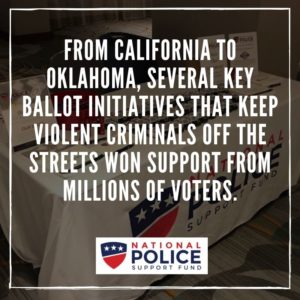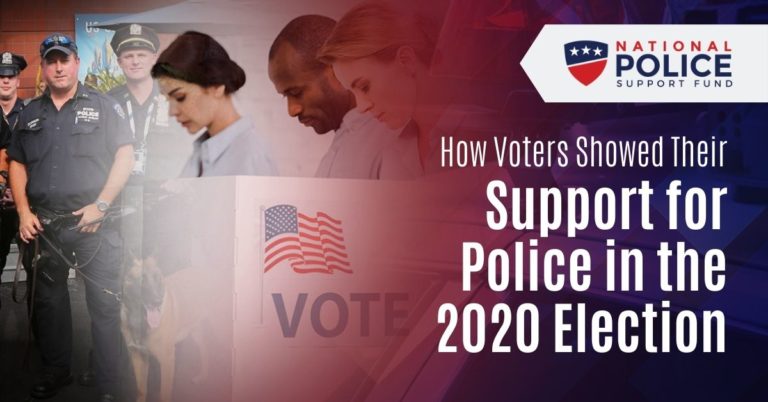Police officers and those who advocate for them had a good day at the polls on Tuesday, as voters weighed in on ballot initiatives to ensure violent criminals can’t easily return to the streets and put our communities back in harm’s way.
Here’s what happened in three decisions that National Police Support Fund supported this fall:
Proposition 25, California
In 2018, California’s legislature passed a law that would replace the state’s traditional bail system with a computer algorithm that would set bail based on factors including public safety and flight risk. It was on the ballot this fall as a veto referendum, thanks to a mechanism in California law that allows citizens to petition laws that they don’t agree with or that need additional modifications.
That was clearly the case here, as Lex Steppling and Dolores Canales, chairs of the No on Prop 25 committee, told the Los Angeles Times.
“We warned our communities that if passed, Prop. 25 would automate racial profiling, give unchecked power to judges and increase funding and power for corrupt probation departments,” they said.
Proposition 25 was also opposed by many sheriffs in California, including Orange County Sheriff Don Barnes, who told the Los Angeles Times that cash bail is an “important mechanism” to ensure that defendants appear in court.

In the end, California’s voters sided with these arguments. According to Ballotpedia, 55% of Californians voted “no” on proposition 25, compared to 44% who voted “yes” — a win of about 1.3 million votes.
State Question 805, Oklahoma
The rule of law also won the day in Oklahoma, as voters rejected a push to prohibit using past convictions in sentencing for new crimes. At the heart of Oklahoma State Question 805 was the state’s enhanced sentencing procedure, which gives prosecutors and judges the ability to consider previous felony convictions when sentencing someone for a non-violent felony.
Those advocating against the measure correctly pointed out that changing the sentencing protocol puts communities at risk by reducing jail time for people who are known to have violent pasts. Opponents of the measure included Oklahoma Governor Kevin Stitt, Attorney General Mike Hunter, district attorneys, and law enforcement officers throughout the state.
Law enforcement officials in the state argued that a “yes” vote would put more strain on them to manage violent criminals who should be in jail, not back out on the streets where they can further harm community members.
“The sheriffs of Oklahoma do not support SQ 805,” Canadian County Sheriff Chris West told Oklahoma’s Fox 25. “If passed, SQ 805 would create a culture that crime is OK in Oklahoma by reducing penalties for career criminals. Habitual offenders of serious crimes would spend less time in prison and put them back on the streets where they can continue committing crimes.”
Nearly two-thirds of Oklahoma’s voters sided with these arguments as the “no” vote received 61% of the vote, compared with just 38% voting “yes,” according to Ballotpedia.
Proposition 20, California
While the other two initiatives were successful, California’s Proposition 20 did not go the way law enforcement hoped that it would. The measure would have allowed prosecutors to charge some misdemeanors as felonies, closed a loophole that allowed convicted child molesters to be released from prison early, and added crimes like felony domestic violence and human trafficking of a child to a list of offenses that make inmates ineligible for early parole.
Law enforcement groups throughout California strongly supported the measure.
“At the end of the day we want public safety. We don’t want lawlessness, we don’t want crime free for alls, and we are seeing that on TV almost daily now,” said Ken Lomba, president of the San Francisco Deputy Sheriffs’ Association. “Prop 20 fixes the loopholes in the past changes in the law.”
However, the measure was introduced in the midst of Black Lives Matter protests and calls to defund the police, and advocates had a difficult time overcoming anti-police messaging and sentiment to reach the state’s voters. The measure was defeated 62%-37%, according to Ballotpedia.
“While we’re confident that those who heard our pro-victim, pro-consumer message voted ‘yes’ — and we’re grateful for their support — we just weren’t able to educate as many Californians as we’d hoped on how Prop. 20 would tackle violent crime and retail theft,” Richard Temple, a political consultant for Proposition 20, told the Los Angeles Times.
With so many issues likely to continue long past the election, our men and women in blue need your support now more than ever to hold these politicians accountable and make sure they give police the respect they deserve. Lend your support to our ongoing efforts. Read more here.









